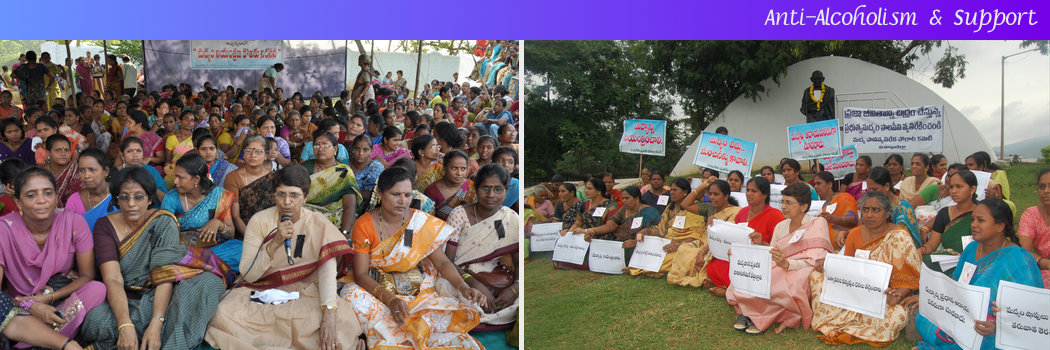Anti-Alcoholism & Support


Why we work on Alcoholism:
Keeping in mind all the below factors, we can certainly say that alcoholism is not only a personal issue but it is a big social problem causing many families suffering by it. Chaitanya Sravanthi took a great step to reduce the ill effects of alcoholism to reduce the poverty among the slums and to build healthy families. A healthy family is a healthy society.
Chaitanya Sravanthi has conducted many campaigns against Anti Alcoholism and created awareness among the groups and women in the working areas through poster campaigns, Post card campaigns, Thaali Nirasana Udyamam, and huge rallies in the city. Chaitanya Sravanthi is trying to reduce the ill effects of alcoholism through counseling sessions.
The Story Behind the Alcoholism: India is vast sub-continent and the drinking habits vary greatly between different states and areas. In recent years there is noticeable rice in the alcohol consumption both in urban and rural areas due to some govt. Policies in licensing and availability and accessibility are high in these days. In rural areas as well as in slums the daily labourers tend to consume alcohol to relax form the routine hard work and gradually addicts to it and becomes a binge drinking.
What Social and economic problems are linked to alcohol use?
Work Performance will be affected: There is ample evidence that people with alcohol dependence and drinking problems are on sick leave more frequently than other employees. This causes the reduce income levels and less productivity at work place. Heavy drinking or alcohol abuse may lead to unemployment and unemployment may lead to poverty.
Family will be affected: Drinking impairs a person as parent and as a partner and leads to domestic violence. Impacts on child social, psychological and economical environment. It leads to substantial mental health problems for other family members, such as anxiety, fear and depression.
The financial costs of alcohol purchase and medical treatment, as well as wages lost affects the partner the need to contribute more to the income of the household and finally it runs an increased risk of sexual violence or risk of HIV infection
Alcoholism leads to poverty: Apart from money spent on drinks, binge drinkers may suffer economic problems such as lower wages, lost of employment and increased medical and other expenses.
–Domestic and sexual abuse is often associated with alcohol abuse
–This type of behaviour is damaging to communities
Alcohol affects various different parts of the body – it’s not just your head that suffers the next day. Check out the different body parts that are impacted when you have a heavy night and discover the effect it has on your health.
Effects of Alcohol on our health and effected body parts:
REPRODUCTIVE: Men may suffer temporary impotence – brewers’ droop – after a bout of drinking. Long-term heavy drinking can cause the sexual organs to shrink in men and women.
Drinking can also increase sexual risk taking that can lead to sexually transmitted infections.
LIVER: Most alcohol that goes into your body is processed by your liver, and if it has to break down too much alcohol the health of your liver will suffer.Long-term, drinking too much alcohol can lead to fatty liver, hepatitis (inflammation of the liver) and cirrhosis (scarring of the liver).
STOMACH: Drinking too much can cause gastritis (inflammation of the stomach lining) and stomach ulcers. It can also lead to uncomfortable reflux – digestive being forced up into your Esophagus (food pipe).
HEART: Moderate drinking may reduce the risk of heart disease for some people over 45, but drinking too much can raise your blood pressure, putting a strain on your heart.
MOUTH AND THROAT: If you drink regularly above the recommended amount you are increasing the risk of developing cancer of the mouth, larynx (voice box), pharynx (upper throat) and Esophagus (food pipe). This risk increases further if you smoke.
BRAIN: The immediate effects of drinking on your brain can include slurred speech, slow reactions, impaired memory and blackouts. Over the longer term, heavy drinking can cause a number of different types of brain damage.

